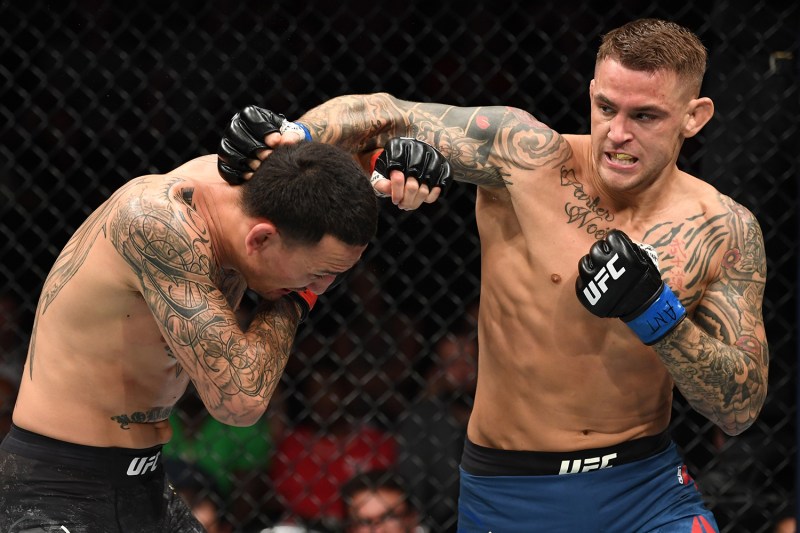
In the early days of the Ultimate Fighting Championship, there were no time limits. They weren’t even considered necessary. Cage fighting, as it was called before the term “mixed martial arts” existed, was a quick and violent endeavor. The UFC’s first official contest lasted a mere 23 seconds and ended with a guy getting kicked in the chops so hard that one of his teeth, freshly knocked from his mouth, nearly hit an announcer sitting ringside. All that changed after UFC 5 when, in a much-hyped rematch of UFC 1’s final, Royce Gracie faced off against Ken Shamrock. What happened there would go down as a flashpoint moment in MMA history regarding its evolution into the sport we all know and love today.
The End of 30-Minute Matches
Gracie, who had become synonymous with his family’s Brazilian Jiu-Jitsu school, had beat Shamrock at UFC 1. Shamrock, a former pro wrestler who cut his teeth in the full-contact Japanese MMA prototype shoot-fighting, was hungry for revenge. In the first minute, Shamrock shot and Gracie caught him in open guard, a neutral position that moved the match from the feet to the floor. Even in today’s hyper-educated fandom, grappling can be boring to watch. UFC 5 proved to be so on an even bigger stage: The two fighters stayed in the prone position, jockeying and shuffling and ultimately achieving little over the next 30 minutes. The UFC never considered this a possibility until it suddenly became a very real problem.
An Introduction to UFC
That first superfight had a 30-minute limit, and although it wasn’t considered a traditional match, it still placed a time cap on a UFC bout. However, the UFC then announced a field-of-play rule change to extend the match an additional five minutes and restart the pair on their feet. It didn’t matter; this time Gracie shot first but again pulled guard, where, with Shamrock atop, the two rode out the remaining minutes. The match was ruled a draw, and while the pair of fighters embraced, raising each other’s hands in victory, it was clear by the crowd’s reaction that no one was satisfied.
So began the changes of length of a UFC fight which would continue over the next decade. At UFC 6 (this was still in the era of single-night bracketed tournaments), the five-minute extension was formalized to the 30-minute limit, along with the ref’s ability to “stand up” two fighters deadlocked on the mat. At UFC 8, three years after the organization’s first event, first- and second-round matches were shortened to 10 minutes, with a 15-minute limit extended to finals and superfights, as in the Gracie/Shamrock snooze-fest.
The Introduction of Five-Minute Rounds
It wasn’t until 1999, at UFC 21, that today’s five-minute rounds were first introduced. Preliminary matches were comprised of two; main-card and non-championship headliners, three; and championship bouts, five. These adoptions formally lowered the max duration of a UFC fight to 10 minutes at its shortest and 25 minutes at their longest. Incidentally, should a match “go the distance,” or run out of time without a knockout or submission, the “10 must” system, carried over from boxing, was introduced, ensuring that there would always be a winner — no matter how controversial.
In 2011, UFC President Dana White announced a further refinement of the rules and extended all headliner matches of a card to the full five five-minute rounds whether a championship was contested or not. This maximum has been upheld in the Unified Rules of Mixed Martial Arts, which the UFC led in creation, adoption, and subsequent refinement and covers such disparate topics as ring measurements, groin protection, and weight classes. (It’s worth mentioning here that regulations regarding performance-enhancing substances, as well as drug testing, are typically set and carried out by state sport commissions rather than the fighting leagues themselves.)
More Questions, Answered
- Do UFC Fighters Wear Cups?
- How Much Do UFC Fighters Get Paid?
- How Many Rounds Are There in a UFC Fight?
- What Does No Contest Mean in UFC?
While matches were once typically finished by submission, knockouts, or missing teeth, in the last few years the trend has seen a slight majority of matches lasting through the final seconds. Researchers believe this to be the result of the UFC athletes’ improvements and the greater standardization of training and technique, but the result is that fans are getting a better show than ever before. So whether it’s a pay-per-view match or a UFC Fight Night streaming on ESPN+, when your partner asks, “How long is a UFC fight?” tell them the truth: Hopefully just a little longer.



